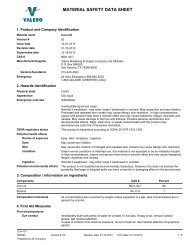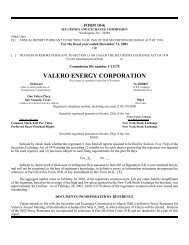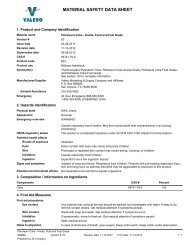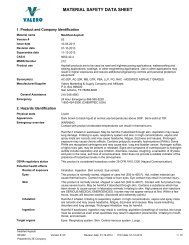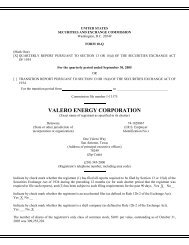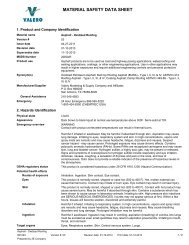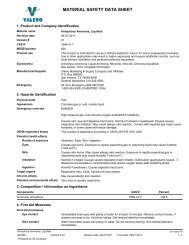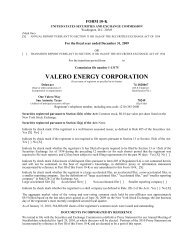Aromatic Concentrate-420 - Valero
Aromatic Concentrate-420 - Valero
Aromatic Concentrate-420 - Valero
Create successful ePaper yourself
Turn your PDF publications into a flip-book with our unique Google optimized e-Paper software.
Chronic effects<br />
Subchronic effects<br />
Carcinogenicity<br />
ACGIH Carcinogens<br />
Benzene (CAS 71-43-2)<br />
Ethylbenzene (CAS 100-41-4)<br />
Toluene (CAS 108-88-3)<br />
Xylene (o, m, p isomers) (CAS 1330-20-7)<br />
IARC Monographs. Overall Evaluation of Carcinogenicity<br />
Benzene (CAS 71-43-2)<br />
Ethylbenzene (CAS 100-41-4)<br />
Toluene (CAS 108-88-3)<br />
Xylene (o, m, p isomers) (CAS 1330-20-7)<br />
US NTP Report on Carcinogens: Known carcinogen<br />
Prolonged and repeated exposure to benzene may cause serious injury to blood forming organs<br />
and is associated with anemia and to the later development of acute myelogenous leukemia<br />
(AML). Toluene has been reported to decrease immunological responses and cause recordable<br />
hearing loss in laboratory animals. Contains organic solvents which in case of overexposure may<br />
depress the central nervous system causing dizziness and intoxication. Danger of serious<br />
damage to health by prolonged exposure. Prolonged or repeated overexposure may cause central<br />
nervous system, kidney, liver, and lung damage.<br />
Subchronic inhalation of benzene by rats produced decreased white blood cell counts, decreased<br />
bone marrow cell activity, increased red blood cell activity and cataracts. Blood disorders may<br />
occur after prolonged inhalation, prolonged skin contact and/or ingestion. Liver and kidney<br />
damage may occur after prolonged and repeated exposure.<br />
A1 Confirmed human carcinogen.<br />
A3 Confirmed animal carcinogen with unknown relevance to<br />
humans.<br />
A4 Not classifiable as a human carcinogen.<br />
A4 Not classifiable as a human carcinogen.<br />
1 Carcinogenic to humans.<br />
2B Possibly carcinogenic to humans.<br />
3 Not classifiable as to carcinogenicity to humans.<br />
3 Not classifiable as to carcinogenicity to humans.<br />
Benzene (CAS 71-43-2)<br />
Known To Be Human Carcinogen.<br />
US. OSHA Specifically Regulated Substances (29 CFR 1910.1001-1050)<br />
Epidemiology<br />
Mutagenicity<br />
Benzene (CAS 71-43-2)<br />
Neurological effects<br />
Reproductive effects<br />
Teratogenicity<br />
Further information<br />
Cancer hazard.<br />
Contains benzene. Human epidemiology studies indicate that prolonged and/or repeated<br />
overexposure to benzene may cause damage to the blood-producing system and serious blood<br />
disorders, including leukemia. Animal tests suggest that prolonged and/or repeated overexposure<br />
to benzene may damage the embryo/fetus. The relevance of these animal studies to humans has<br />
not been fully established. Studies have shown a risk of spontaneous abortions in women<br />
exposed to high concentrations of organic solvents during pregnancy.<br />
In in-vitro experiments, neither benzene, toluene nor xylene changed the number of<br />
sister-chromatid exchanges (SCEs) or the number of chromosomal aberrations in human<br />
lymphocytes. However, toluene and xylene caused a significant cell growth inhibition which was<br />
not observed with benzene in the same concentrations. In in-vivo experiments, toluene changed<br />
the number of sister-chromatid exchanges (SCEs) in human lymphocytes. Toluene may cause<br />
heritable genetic damage.<br />
Chronic exposure to high concentrations of various hydrocarbon blends may lead to<br />
polyneuropathy (peripheral nerve damage), characterized by progressive weakness and<br />
numbness in the extremities, loss of deep tendon reflexes and reduction of motor nerve<br />
conduction velocity. Numerous cases of polyneuritis have been reported following prolonged<br />
exposures to a petroleum fraction containing various isomers of heptane as major ingredients.<br />
May cause central nervous system disorder (e.g., narcosis involving a loss of coordination,<br />
weakness, fatigue) and/or damage.<br />
Benzene, xylene and toluene have demonstrated animal effects of reproductive toxicity. Animal<br />
studies of benzene have shown testicular effects, alterations in reproductive cycles, chromosomal<br />
aberrations and embryo/fetotoxicity. Ethanol has demonstrated human effects of reproductive<br />
toxicity. May damage fertility or the unborn child. Can cause adverse reproductive effects - such<br />
as birth defects, miscarriages, or infertility. Avoid exposure to women during early pregnancy.<br />
Avoid contact during pregnancy/while nursing.<br />
Abusive inhalation of toluene ("glue sniffing") has been reported to be associated with birth<br />
defects in the offspring of abusers. Rats exposed to benzene and xylene vapor during pregnancy<br />
showed embryo/fetotoxic effects.<br />
Symptoms may be delayed.<br />
<strong>Aromatic</strong> <strong>Concentrate</strong><br />
900670<br />
Prepared by 3E Company<br />
Version #: 03<br />
Revison date: 11-13-2012 Print date: 11-13-2012<br />
CPH MSDS NA<br />
8 / 12




